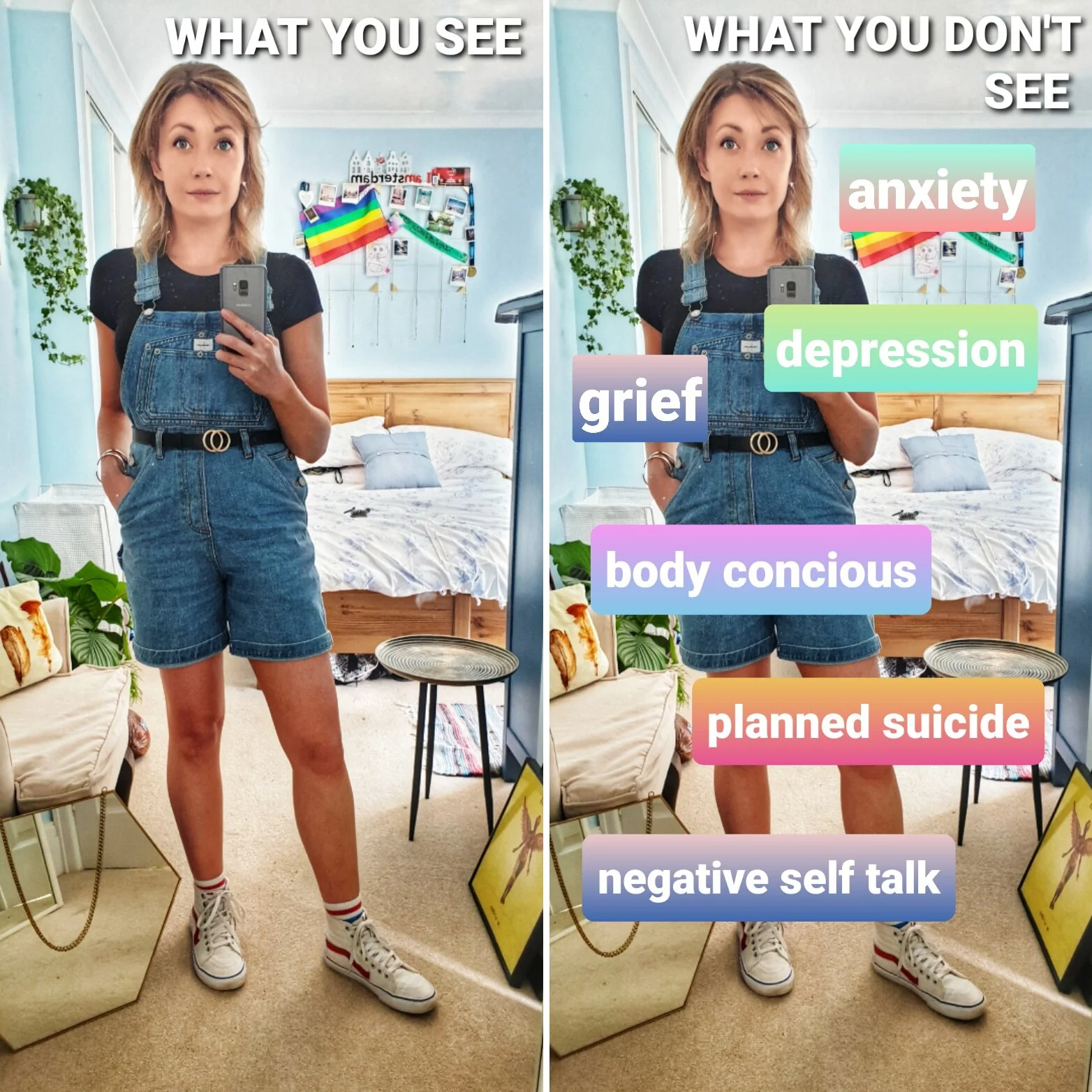How do we tackle mental health stigma?
#BeKind was trending in the wake of the death of TV celebrity Caroline Flack to suicide in February 2020. The public called out the tabloids and British press who had printed scandalous and false stories about Caroline’s personal life. #BeKind called out all the twitter trolls who had hounded her relentlessly in the months leading up to her death. It got people talking about depression and suicide and how so much more needs to be done to prevent such tragedies. And yet here we are in 2024, with the death of One Direction singer Liam Payne, the #BeKind message seems all but forgotten. Stigma around mental illness is still a big problem globally and it is costing lives every day.
My experience with mental health stigma
In the months before I was hospitalised, I had become pretty good at hiding my depression. I had mastered the art of putting on a front. I didn’t want to share with anyone that I had a mental illness. I certainly didn’t want to share that I was feeling suicidal. I had opened up to someone who I loved and trusted, but their reaction left me feeling embarrassed and ashamed. I never wanted to be judged like that again, so I kept silent. I believed I would only become a burden if I spoke to loved ones. And so I put on a fake smile and hid my struggles from everyone. The truth was I was really ill, but nobody could see it. Having an invisible illness made me feel vulnerable and misunderstood. I would go on to experience stigma throughout my recovery. I’ve been called crazy. I’ve been told to get a grip. I’ve been called selfish and branded an attention seeker. Some questioned if I had depression because I seemed so bubbly and normal. Others called me boring for not wanting to socialise when my depression was at it’s worst. I was not always treated with kindness and as a result, I stopped being kind to myself. I never showed myself compassion. I never showed myself forgiveness for the trauma of losing a parent followed immediately by an unamicable divorce. If there is one thing I could change about my experience with mental illness, it would be kindness.
Why being kind to others matters
Being kind to others is the simplest way we can all support each other as a human race. The act of someone showing us kindness is proven to have a positive impact on our mental health. Kindness makes us feel valued, appreciated, and recognised. For me, when depression was at its worst, I felt so alone. Even though I was surrounded by loved ones, I felt unloved. So trust me when I say that a little kindness goes a long way. Imagine if we all truly got behind that #BeKind message and lived it every day. Just think how much difference we could all make in the fight to end mental health stigma?
Embedding small acts of kindness into our everyday lives is something we call all do. It costs nothing and it’s simple to achieve. Whether it is texting a friend (even that strong friend who seems to have it all together) to ask them how they are, giving up your seat for someone else on public transport, making a cup of tea for a colleague who is stressed out or simply saying ‘Good morning’ with a smile to a passer-by. These little acts of kindness will help someone feel just that little be more loved. It may give them that feeling of love that they so desperately need. Showing others kindness and seeing the difference it makes can give us those feel good vibes which can boost our own mental health. Did you know some studies have found that when we help others, it promotes changes in the brain that are linked to our own happiness? Kindness brings benefits to both parties.
Why being kind to ourselves matters
Showing ourselves kindness and compassion is vital when it comes to managing our own mental health. It is important recognise when we don’t feel ok or when we are feeling overwhelmed. We will all face times of increased pressure and stress, so it is important to be kind to our minds and give ourselves a break when we need it. Trying to muddle on through or thinking we can just shake off those feelings is only going to do us more harm. Much like you would not neglect any symptoms of a physical illness or injury, we must not neglect any signs of mental strain. One of the ways I commit to showing myself kindness is by practicing self-care. Self-care is a great way to show ourselves kindness by taking time out to do something we enjoy or that supports our needs. It is an essential practice that helps us to manage and maintain good mental health. Self-care isn’t just bubble baths and pampering. It is about putting our mental and emotional needs first, so that we can re-charge and show ourselves care when under stress.
Other ways to be kind to ourselves is stepping back from habits that only negatively impact our mental health. One of the biggest changes I have made since reaching mental health crisis is the way I talk to myself. I have historically been my own worst critic and would very much given in to self-doubt. I would deflect criticism and rejection from others back onto myself and I never believed I was good enough. But now I am treating myself with the kindness I know I deserve. I work hard to talk to myself like I would to someone I love. I often ask myself “What would a friend say if they heard you speak about yourself like that?” when those self-critical thoughts creep in. 9 times out of 10 it really helps me to take back control and put up a good fight against depression. The more I practice self-love, the more I am starting to improve the relationship I have with myself.
Spreading kindness
I want to encourage you all to starting spreading kindness so we can all do our part in creating a shift to bring an end to mental health stigma. The truth is you never truly know what is going on under the service with anyone, so the bare minimum we can do is to just be kind to one another. I challenge you to start embedding small acts of kindness into your every day. Check in on that strong friend who seems to have all their shit together. Smile and say thank you to the barista the next time you order a cup of coffee to go. Say good morning to a passer-by on your next socially distanced walk. Be mindful of self-comparison when it comes to social media. Ask yourself why your family member snapped at you out of the blue recently and check that they’re ok. Don’t punish yourself for struggling. Don’t compare yourself with others. Take time out for yourself. Listen to a podcast. Enjoy the great outdoors. Bake that cake. Binge watch Netflix and Disney+. Book that solo trip!
Thank you for reading my blog. I’d love to hear why you think kindness matters. Please share your acts of kindness, both to yourself and others, in the comments.
You are not alone
Samaritans
They are open 24 hours a day, every day of the year.
Telephone: 116 123
Email: jo@samaritans.org
Website: www.samaritans.org
Papyrus UK
Work with people under 35 who are having suicidal feelings. And with people who are worried about someone under 35.
Telephone: 0800 068 41 41
Email: pat@papyrus-uk.org
Text: 07786 209697
Website: www.papyrus-uk.org
Sane Line
Work with anyone affected by mental illness, including families, friends and carers.
Telephone: 0300 304 7000 (4:30pm – 10:30pm every evening)
Website: www.sane.org.uk
C.A.L.M. (Campaign Against Living Miserably) Aimed specifically at men. Their helpline is open between 5pm and midnight every day of the year.
Telephone (outside London): 0800 58 58 58
Telephone (London): 0808 802 58 58
Webchat: www.thecalmzone.net/help/webchat/ (5pm – Midnight every day)
Website: www.thecalmzone.net
Silverline
Aimed at people over 55. Their helpline is open 24 hours a day, every day of the year.
Telephone: 0800 4 70 80 90
Website: www.thesilverline.org.uk






Coping with grief on anniversaries or significant dates can evoke powerful memories and emotions. I share my coping strategies on coping with grief on anniversaries to help others facing loss and bereavement.